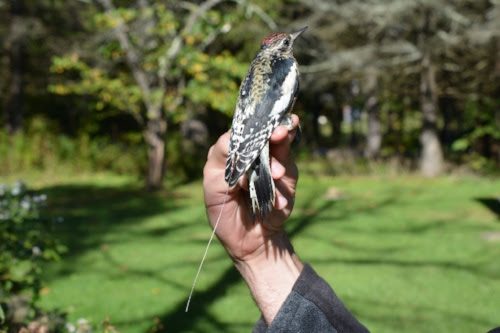
Avian researchers around the country are flocking to Carnegie Museum of Natural History’s Powdermill Nature Reserve on April 6 to 8 to learn about the new Motus Wildlife Tracking System for monitoring birds.
The workshop at Powdermill – a museum field station where researchers study natural wildlife and plants in this region – teaches participants about the revolutionary Motus system that tracks wildlife movements.
For more than five decades, Powdermill researchers have tracked changes in bird populations through the bird-banding program. However, fewer than one in 1,000 birds can be re-identified at another location once they fly away from Powdermill. With this Motus technology, radio-frequency nanotags are attached to even small bird species. The nanotags, about the size of a black bean, emit an electronic coded signal, and each individual is different. Sensors can detect wildlife with the nanotags within a 9-mile radius. The results are remarkable: Out of 47 nanotags Powdermill workers recently placed on five bird species, 17 birds – 36 percent – were re-detected later.
Workshop participants – including two from Smithsonian’s Migratory Bird Center – will set up a Motus station, and some will attach nanotags to live birds. Attendees will learn about how researchers use the Motus network, and its limitations. The event at Powdermill, located about 55 miles southeast of Pittsburgh in a mountainous area, offers many photo and interview opportunities.
Who:
Carnegie Museum of Natural History’s Powdermill Avian Research Center
When:
Friday, April 6 at 5 p.m. To Sunday, April 8 at 2 p.m.
Where:
Powdermill Nature Reserve
1795 Route 381
Rector, PA 15677
Workshop Details for Researchers:
The Motus Wildlife Tracking System has revolutionized how we record animal movements in nature. Powdermill Avian Research Center (www.powdermillarc.org) is pleased to announce that it will be hosting a workshop on Motus technology beginning 5pm Friday April 6th, and ending 2pm Sunday April 8th. The workshop will be held at Powdermill Nature Reserve, the field station of the Carnegie Museum of Natural History (Pittsburgh) located in the beautiful mountains of Western Pennsylvania near Rector. The workshop is aimed towards those with little or no experience utilizing nanotags and the Motus Wildlife Network. Participants will gain hands on experience setting up a Motus station and attaching nanotags to live birds (for participants sub-permitted to band birds). Presentations will focus on project planning, examples of how the network has been used for research, and limitations of the technology. Workshop registration is $50 and includes meals Friday evening through Sunday afternoon, and shared housing in modest cabins on property free of charge (bring your own linens). If you wish to stay elsewhere, standard accommodations are available at several nearby hotels for approximately $100 per night. Participants will be responsible for their own transportation.
Workshop Schedule:
PARC Motus Workshop Schedule (subject to change in inclement weather)
Friday (PNR Nature Center)
5 pm: Introductions & Intro to Motus
6 pm: Dinner
7 pm: Presentation – Motus station equipment
Saturday
6:30 am @ PNR Nature Center:
Grab and go breakfast at PNR Nature Center
7 am – 10 am @ PARC:
Small groups – attaching transmitters to birds, on the ground tracking
10am-11:45am @ Crisp Field:
Begin Motus station build
12pm – 1:15pm @ PNR Nature Center: Lunch
1:30pm @ Crisp Field:
Resume and complete Motus station build
4pm @ PNR Nature Center:
Presentations – Project planning, Motus station site selection, ordering transmitters
6pm @ PNR Nature Center: Dinner
7pm-8pm @ PNR Nature Center:
Metadata & data – tag registration, station registration, station data uploads.
Sunday
6:30 am @ PNR Nature Center:
Grab and go breakfast
7 am – 11:30am @ PARC:
Small groups – hands on experience with attaching nanotags, tag registration, building antennas & sensorgnomes
12 pm @ PNR Nature Center: Lunch
1pm-2pm @ PNR Nature Center:
Facebook live Q&A on PNR Facebook Page

